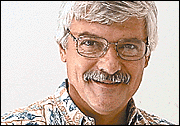Advertisement - Click to support our sponsors.


Capitol View
LOS ANGELES -- Convention officials are passing out pagers and three Internet-connected Palm Pilots to convention chairmen, there is at least one certifiable movie star or music entertainer at every nightly post-convention bash and, by official estimate, there are three news media members for every delegate at the Democratic National Convention. Pageantry replaces
politics at conventionThe entire extravaganza is held in the plush Staples Center, with three rings of sky boxes for corporate and political elite to gather. Inside, 18 giant color screens flash changing messages to remind delegates of the political message of the moment. The promo for AlGore.com changed to "America: better than ever" and then "Thank you President Clinton."
Outside, a 12-foot chain-link fence and police in riot gear grimly mark off the complex.
This is spectacle on a Hollywood IMAX scale. But is this hoopla really needed?
No one would dare suggest that there is any suspense in this political kabuki drama. The naming of Sen. Joe Lieberman of Connecticut as the vice presidential choice was absolutely the last unknown to be answered about the convention.
The Republican Party two weeks ago in Philadelphia was also running a timed, paced and choreographed convention. Still the question remains, what is the purpose of these national political conventions every four years?
They have become something of the political American Olympics. If you can make it to the podium here, you are among the best in the country.
Hawaii's Sen. Daniel Inouye, who is speaking at this convention, is still described as the politician who gave the keynote address to the chaotic 1968 convention in Chicago.
At the convention as a first-time delegate is 38-year-old Maui Mayor Kimo Apana. Everything is new to him and he is excited.
"It is like watching a football game," he says. "It isn't the same game if you watch it on TV; you have to be here to really see it."
Tony Takitani, a former state House member, now a Maui attorney, agrees the convention is no longer about selecting the party's presidential candidate, but about "giving a message to the party faithful."
"Maybe some of the excess is not needed, but with the players here, the media is going to come. People want to see their leaders and hear them," he said.
Of course, there is a need to report and give as much information as possible about the national political parties, the process and the inner workings of the decisions made by the two parties. So the media must be there to play that role.
BUT, at the same time, reporters know they are being used to get out a message.
"People want to see and hear what George Bush and Al Gore have to say," Hawaii delegate Lorraine Akiba says.
The convention is probably the last big chance for both Democrats and Republicans to send an unfiltered message straight to American voters.
The scope of the message may be smaller, television doesn't do gavel-to-gavel coverage anymore, but all four major networks Monday night stuck with President Clinton's farewell address, even though it was late in coming. Local television stations in L.A. then wound up the evening with a half-hour live helicopter report on a police car chase on a freeway, showing that news judgment isn't really all that high-minded after all.
But, as Hawaii's Gov. Ben Cayetano said before the convention, there may not be a real need for the national political convention, but it is still going on every four years and the politicians and the press will be there.
Richard Borreca reports on Hawaii's politics every Wednesday.
He can be reached by e-mail at rborreca@starbulletin.com